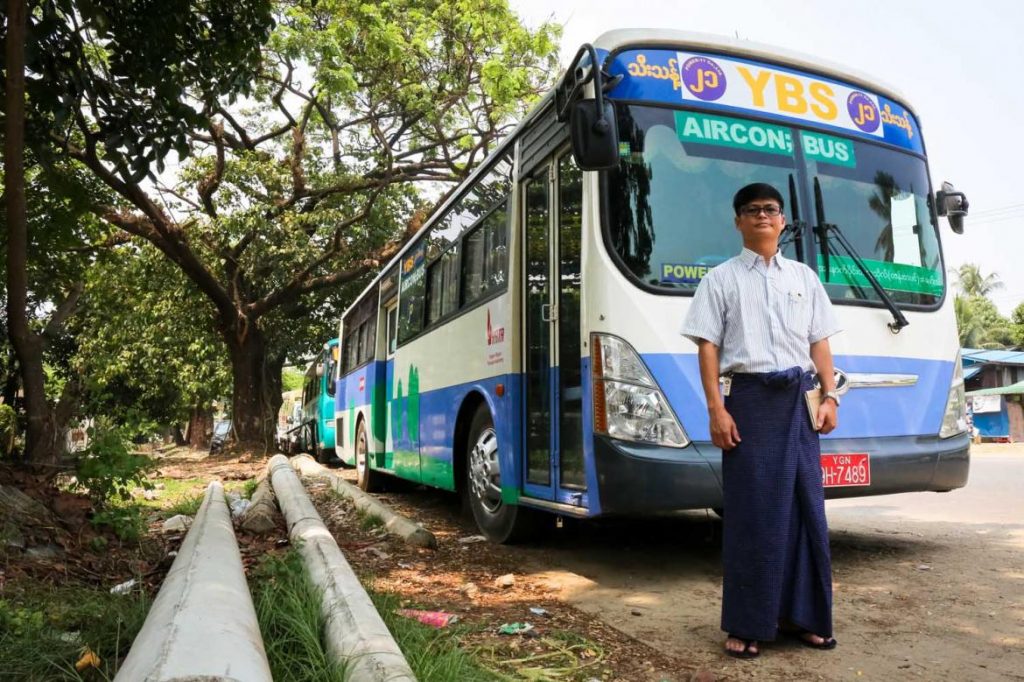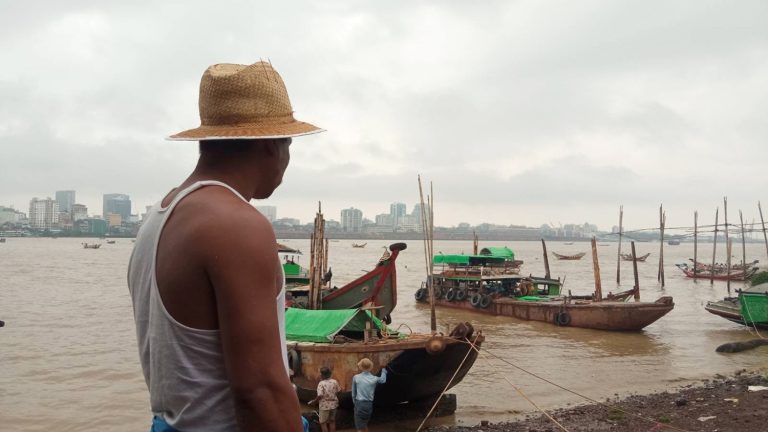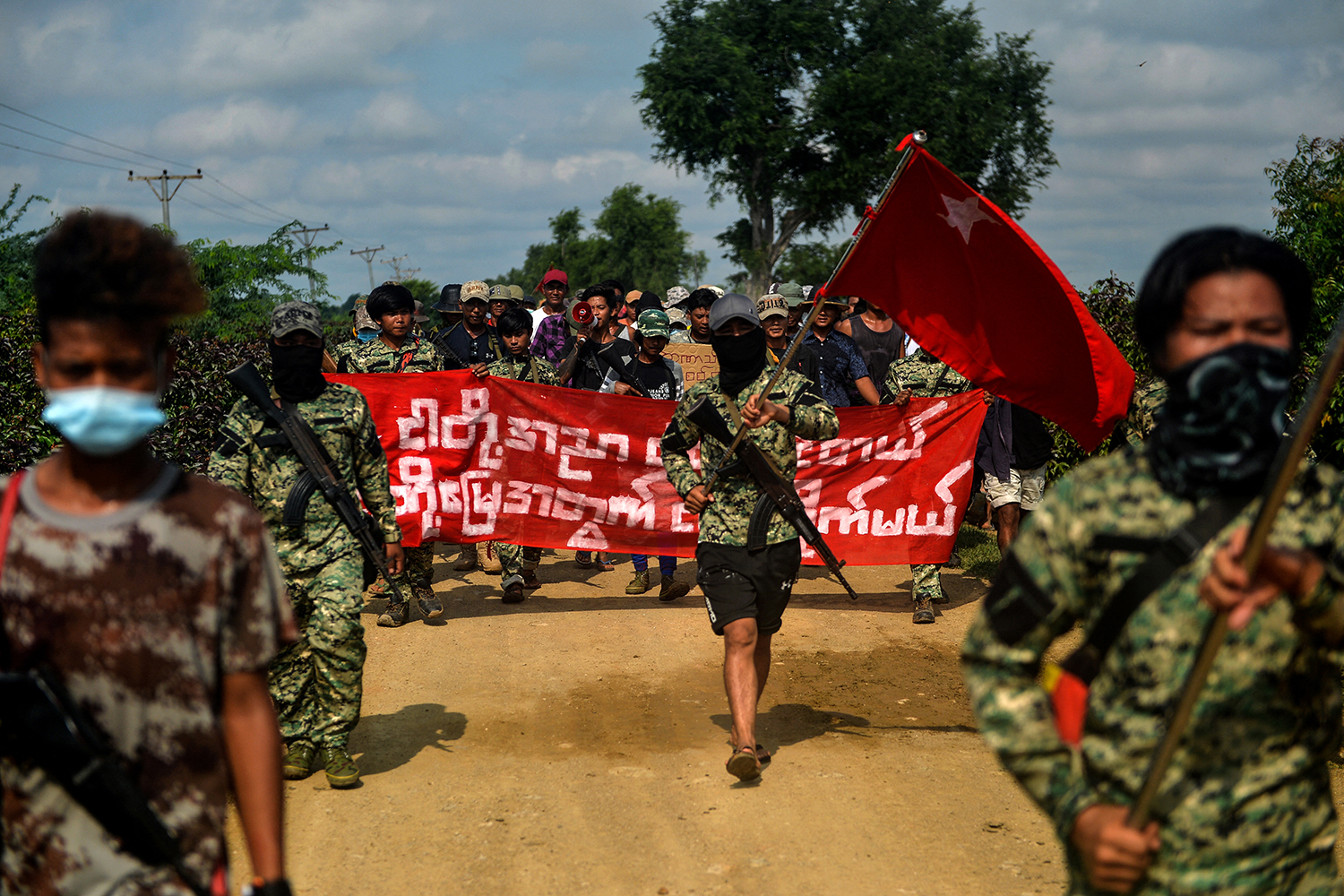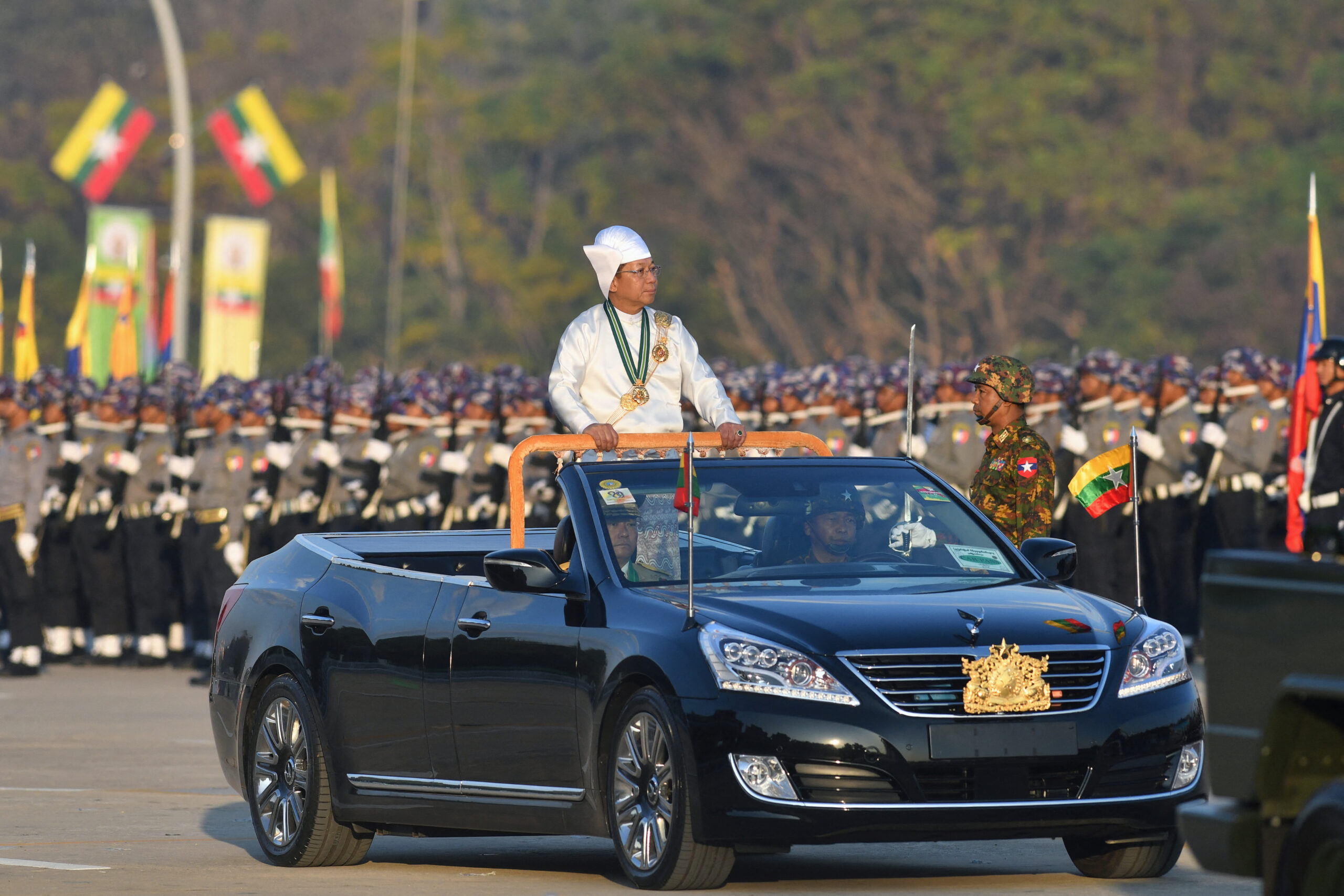A bus company in Yangon has achieved success, and rare popular acclaim, because its owner has put passengers first with innovations that include an honesty fare system.
By KYAW PHONE KYAW | FRONTIER
ASK YANGON residents about the hottest topic around the teashop table these days and they won’t hesitate: It’s the Yangon Bus Service, the brave initiative launched by Chief Minister U Phyo Min Thein in January to upgrade the city’s busiest mass transit system.
The chatter about the YBS has not been positive. Teething problems marred its launch and it quickly became the target of wry Myanmar humour. YBS, many joked, was an acronym for “You’ll Be Sorry”. For Phyo Min Thein, a rising star in the National League for Democracy, problems with the introduction of the YBS, including resistance from vested interests, have been an embarrassing setback.
As manager of the Yangon Region Transport Authority, he’s in the hot seat because it manages the YBS, which replaced the notoriously bad service run by the military-linked Central Supervisory Committee for Motor Vehicles, known colloquially by its acronym Ma Hta Tha.
The cavernous chamber of the Yangon regional parliament echoed with complaints about the YBS from 26 MPs last week. Some said the only change between the corruption-riddled Ma Hta Tha and the new service was the YBS stickers on the city’s bus fleet.
Support more independent journalism like this. Sign up to be a Frontier member.
In a stinging rebuke, Daw Kyi Pyar (NLD, Kyauktada-1) also accused those who planned the YBS of being out of touch with the needs of commuters.
“The YBS is the result of decisions made by people in air-conditioned rooms for ordinary people under the sun,” she said.
The MPs who spoke out against the YBS were expressing the views of most commuters, with one notable exception.
There’s a bus company in Yangon that is winning applause from the public because it offers a comfortable, courteous service. It operates on the No 21 line, which plies the route between the University of West Yangon and Maw Tin in downtown Yangon via Insein and Pyay roads. Its owner is the quietly spoken, industrious and innovative U Thant Zin Win, 41, who is better known within the bus industry and on social media by his nickname, Ko Tayoke Lay. It’s a nod to his ancestry and means “Little Chinese Brother”.
The YBS was planned by high-ranking officials and highly-qualified consultants; the successful Ko Tayoke Lay was educated to fifth grade.
Ko Tayoke Lay’s long journey to success began when he started working on buses in the 1990s. He was a conductor for six years, a driver for 12 years and managed a bus company – at which he was also the mechanic – before going into business with his own bus.
“I started from a low level and it enabled me to understand how to run a bus line from the ground up,” he told Frontier.
Another key to his success was a rare resolve to put passengers first.
“I tried to show goodwill towards passengers,” he said, adding that he always strived to ensure that travelling on his buses was a pleasant experience.
“There was a time when I constantly felt ashamed because people never said anything good about the buses [in Yangon]. I even asked my siblings not to say we were making a living from the bus transportation business,” he said.
The shame he felt was a powerful incentive to provide the best possible service.
“According to Buddhist teachings, our business is not a sin because it does not involve killing or lying; it is just a service to get people to their destinations. The industry has a notorious reputation because of very bad service. I wanted to save face by offering good service,” Ko Tayoke Lay said.
In about 2006, he started running his own bus and as his reputation for providing good service grew, other owners put their vehicles under his management. Eventually, he was managing nearly 100 buses, nearly all of which were running on the No. 48 line, between Insein and the Sule Pagoda.
In 2014, Ko Tayoke Lay began implementing far-reaching changes in pursuit of his dream of providing the best possible service, starting with his own fleet.
He made sure his buses were clean, refitted them with air-conditioners, installed comfortable seating and, in a radical step for a Yangon bus line, introduced ticket sales to avoid disputes between passengers and conductors, who have a reputation for short-changing commuters.
“It was a total failure,” he said.
The upgrade lost money and some business partners deserted Ko Tayoke Lay. They blamed him for introducing the changes and they lost face when they lost money, he said.
“It’s normal to be angry if you’re a partner in a business and it fails, so I could understand why they gave up on my management,” he said.
It was a setback but Ko Tayoke Lay was undaunted. “I tried again in 2015 using the lessons learnt from the past failure,” he said.
The lessons were many. One was the realisation that the industry had a bad reputation because it was attracting bad people, including the staff who cheated him out of a lot of money.
Another problem was Ma Hta Tha. It did not accept his ticket sales innovation and forced him to shut it down.
“It was like I had fallen on my face,” he said.
Ko Tayoke Lay decided that he did not want to work with “bad people” again and that he needed to create a good working environment to attract employees of a good calibre.
He introduced a change that was far more radical in Yangon’s male-dominated bus industry than ticket sales: he employed 20 women to work as conductors.
“The conductors back then were rude and impatient and I was confident that women conductors would provide a better service,” he said, adding that he built understanding among them about his passenger-first philosophy before they started work.
Another innovation was a notice board on his buses displaying his phone number for passengers to call if they had complaints, because the complaint service at Ma Hta Tha was overloaded and ineffective. He went a step further. The notice board also said: “Please ask the driver for a taxi fare if he drives past your stop. If he won’t pay it, call me.”
Other changes were a driver ban on speeding or racing other buses, one of the most common complaints of commuters on other lines.
The innovations kept coming.
He reassigned the role of conductors from selling tickets to helping elderly passengers and keeping the vehicles clean. Passengers were asked to deposit their fares in a basket near the door of his buses. They were less crowded than other buses because passenger limits were imposed.
Male and female conductors were taught how to drive so they could become drivers. Most of his buses no longer have conductors.
A recent innovation was the boldest of all and news of its introduction went viral on social media. He upgraded three buses to highway coach standard and introduced an honesty system for fares that has proved enormously popular.
“It’s been very successful; 80 percent of the passengers pay K500 for what is normally a K200 fare and 10 percent pay K1,000,” Ko Tayoke Lay said.
“I’m making more money than other lines because my passengers are satisfied with the service. I tested this system to see if passengers would like it and now I know they do I will be expanding it,” he said.
As well as bringing success, the introduction of the honesty fare system has also been a shrewd move.
Ko Tayoke Lay said it had broken a vicious circle because the government did not allow the increases in fares that would generate the income needed to upgrade vehicles and service.
“If I had increased fares, I would have been penalised by the government, so I’ve created a way of escaping from this circle,” he said.
The company owned by Ko Tayoke Lay and his partners, Power Eleven, has about 100 buses.
It is one of two companies that operate on the No 21 line, but by Frontier’s observation Power Eleven offers a far superior service to its competitor.
Ko Tayoke Lay is planning to make Power Eleven a public company and give priority to selling shares to passengers. He also wants to build air-conditioned bus stops.
He believes the YBS is facing challenges because it is not practical.
“The government has goodwill, I believe, but it has created a system that does not suit the conditions under which it has to operate,” he said.
He suggested that instead of shutting down existing lines that were not successful, the government should focus on improving them to enhance their reputation and make them profitable.
“Infrastructure is only about 30 percent of the system; it’s the mindset and attitudes of the people running the system that need to change for it to be a success.”
TOP PHOTO: U Thant Zin Win, better known as Ko Tayoke Lay, stands inside one of the 100 buses his company, Power Eleven, operates on the YBS No 21 line. (Victoria Milko | Frontier)







